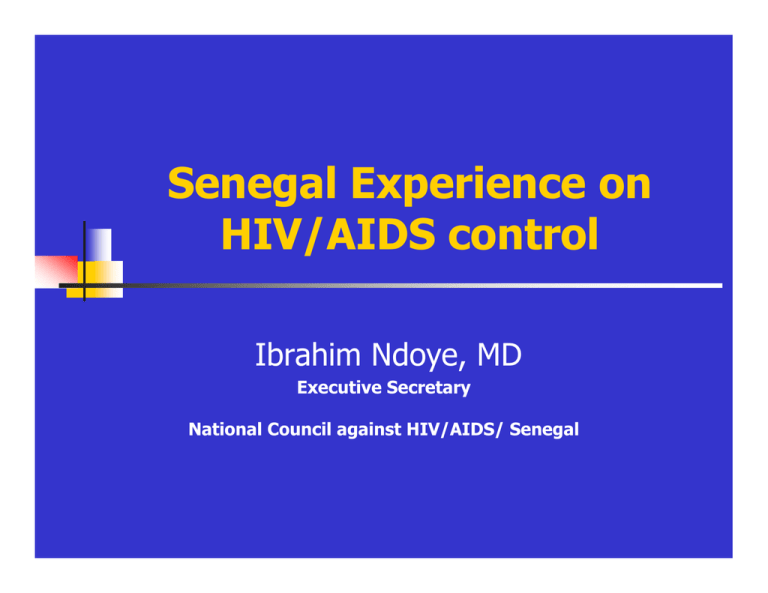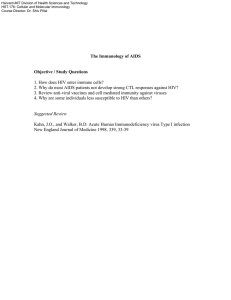
Senegal Experience on
HIV/AIDS control
Ibrahim Ndoye, MD
Executive Secretary
National Council against HIV/AIDS/ Senegal
Background
Concentrated HIV epidemic country
low prevalence in general population : 1%
15 - 25% in commercial sex workers
Heterosexual transmission predominant
Cultural and traditional practices
(circumcision…)
Transmission through unsafe injections may
be important
Early and nationwide response:
Policies
•
•
•
•
•
•
Blood Transfusion Bank (1970)
National Sexually Transmitted Disease Program
(1978)
STI prevention program for Commercial Sex
Workers (1978)
Early National AIDS Control Program (NACP) since
1986
Integration of HIV and STI programs (1987)
Blood Transfusion Safety Policy (1989)
Early and Nationwide response:
change of behavior
•
•
•
•
Numerous communication and behavior change
interventions
Involvement of more than 1000 NGOs, People Living
with HIV (PLWHIV), religious leaders network
Promotion of social marketing for condoms
Targeted programs:
Youth, women, schools, militaries, high risk groups
(migrants, commercial sexual workers…)
Multisectorial approach
Public sector
Ministries of Health, Education, Women,
Youth , Army
NGOs, Community organizations, Religious
groups
Private sector
Involvement of private companies
Sustainable and strenghened efforts
First governmental initiative access to ARV on
1998
Reinforcement of prevention and care efforts
Community interventions
PLWHIV capacity building and networking
Nationwide response : Political leadership
Head of State’s committment
Government and Political support for the
NACP
Annual budget $250 000 (1985)
increased up
to annual budget $2 millions (2002)
Results :
Trends of HIV prevalence in Dakar, 1989 - 2001
20
15
pregnant women
STD patients
Prostitute
10
5
20
01
19
98
19
96
19
94
19
92
19
90
0
19
88
HIV prevalence (%)
25
years
Source : sentinel surveillance
MOH-Senegal
STI among pregnant women in Dakar, 1991-1996
35.00%
30.00%
25.00%
20.00%
15.00%
10.00%
5.00%
0.00%
Trichomonas Chlamydia
Neisseria
Vaginalis
Trachomatis gonorrhoeae
Source : Rapid assessment MOH, Senegal.
Syphillis
Trends of condoms distribution in Senegal
(1988 - 1997)
8000000
7000000
6000000
5000000
4000000
3000000
2000000
1000000
1988 1990 1992 1993 1994 1995 1996 1997
Source : MOH, Senegal.
0
Condoms
Injection Safety and waste management
Partnership built with BASICS/USAID, WB, PATH,
WHO and UNICEF
Technical Support to an injection practices survey
conducted nationwide (2002)
Development of a draft injection safety policy(2002)
Development of a waste management policy (2001)
Conclusion
Early and nationwide response successfully contained HIV
epidemic in Senegal
Safer practices was a big challenge for the National AIDS
Control Program
New strategies such as MTCT, VCT, ART treatment and
reducing transmission through unsafe injection would be new
challenges to maintain better results on 2006



